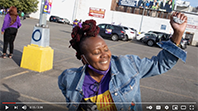Communicating about vaccines: Investing in trusted messengers [video]
Wednesday, August 11, 2021As the Delta variant surges, it’s more critical than ever to communicate with the public in ways that foster trust. In this new video, the first in a new series from Berkeley Media Studies Group, BMSG offers strategic communication tips to help public health advocates and practitioners do just that. Check it out and learn more about COVID-related communication at www.bmsg.org/covid-19.
Transcript
[NARRATOR]: Vaccines save lives. We know that from research, but many people remain hesitant to get their shots.
To boost confidence in the vaccine, we not only need to give people access to it in places they trust, but we also need to deliver accurate information about it through trusted messengers.
[SARAH PEREZ-SANZ, BMSG RESEARCHER] Dr. Anthony Fauci is definitely and expert, but some people may think that, oh, he doesn't know enough about my family. He's not an expert in my kids.
[SURGEON GENERAL DR. VIVEK MURTHY]: What we have to do is not only get information out there through traditional sources and through the media; it's working with local nurses and doctors, with teachers, with faith leaders, and others in local communities to make sure they have information that they can use to share.
[NARRATOR]: Research from the Berkeley Media Studies Group aligns with the surgeon general's recommendation.
[PEREZ-SANZ]: So, you know, data is important. We collect data as part of our research, but stories are really what drives the data home for people. So, if someone has their own experience from going from vaccine hesitancy to having their kids or themselves fully vaccinated, that journey is really important to share with others. And while we can capture that in our research as data, it really only matters to people if you tell the story of how they went from vaccine hesitant to fully vaccinated.
Public health advocates and champions can reach out to find people who have decided to be vaccinated, and who are excited to be vaccinated, and talk to them about what being vaccinated means to them.
You can have them author op-eds, letters to the editor, you could even use them as contacts; if a reporter were to call you, you could say, "Hey, you should also talk to so-and-so because they are super excited to get vaccinated, and they have a really great story."
[NARRATOR]: BMSG monitors the news to find out what that looks like in practice.
[PEREZ-SANZ]: This article [from The Wall Street Journal] came out right when 12- to 15-year-olds were starting to be able to be vaccinated. So, people were signing up; people were excited to get their kids vaccinated because it's been a long year and a half. And so this article includes quotes from youth and then also parents. So, there's just a lot of great voices in this article.
First, I want to highlight Elliott Ferris. He's a 13-year-old, and his mom signed him up for a vaccine appointment at his pediatrician's office. And Elliott, he was so excited, he said, quote, "That's so dope!" and that quote "I've had such a long year-and-a-half without friends. We're just so bored and a little bit lonely."
So Elliott really speaks to the fact that, you know, he gave up a lot. He had to sacrifice a lot over this past year. Now that he will be vaccinated, he can get back to doing the things that he loves to do with his friends.
For more tips on communicating effectively about COVID-19 and vaccines, visit bmsg.org/covid-19.




